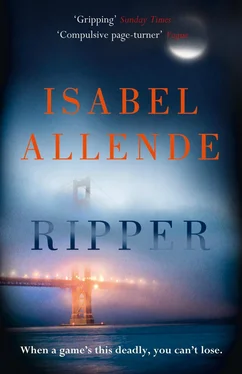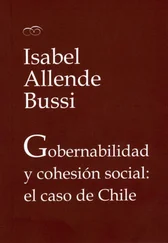The deputy chief told the patrol officers to call for backup and to set up a cordon around the house to keep away rubberneckers and the media, who, given the victim’s celebrity, would probably descend on the place very soon. He followed Ayani along one of the side paths to a building adjoining the main house, built in the same ultramodern style. She explained that her husband used the study as a consulting room for his private patients, since it had a separate entrance and there was no connecting door with the house.
“You’ll catch cold, Ayani,” said Bob. “Go and find something to wrap up warm, and put some shoes on—”
“I grew up with no shoes—I’m used to it.”
“Well, then, wait outside, please. There’s no need for you to have to see this again.”
“Thank you, Deputy Chief.”
Bob watched as she glided away across the garden and adjusted his pants, embarrassed by his ill-timed and deeply unprofessional reaction, which unfortunately he experienced quite often. He shook his head to dispel the images provoked by this African goddess and stepped into the annex, which was made up of two large rooms. In the first, the walls were lined with bookshelves and the windows screened by thick linen curtains; there was an armchair, a brown leather sofa, and an antique carved wood table. On top of the wall-to-wall cream carpet lay two well-worn Persian rugs whose quality was evident even to someone as inexperienced in interior design as Bob. Making a mental note of the coverlet and the pillow on the sofa—it must be here that the psychiatrist slept—he scratched his head; why would Ashton rather sleep here than in Ayani’s bed? Now if it were me . . . He pulled himself out of his daydream and returned his attention to his duties.
On the table rested a tray with a coffeepot and a clean cup; when Ayani set it down, she must not yet have seen her husband. Bob stepped into the other room, which was dominated by a large mahogany desk. He was relieved to see that the first responders had not actually set foot in the studio itself but had assessed the situation at a glance and withdrawn so as not to contaminate the crime scene. He had a few minutes before his forensics team arrived in force. He pulled on a pair of latex gloves and began a preliminary inspection.
Richard Ashton’s body lay supine on the floor next to the desk, bound and gagged with duct tape. He was dressed in gray pants and a pale blue shirt; his blue cashmere cardigan was unbuttoned, and he was barefoot. The wild, staring eyes bore a look of sheer terror, but there were no signs that the man had struggled: everything was neat and tidy except that some papers and books were damp. The ink from the documents had run a little, and Bob carefully moved them away from the spilled liquid. He studied the body, careful not to touch it; it had to be photographed and examined by Ingrid Dunn before he was allowed to lay a hand on it. He could see no visible wounds, no blood. He glanced around for a weapon, but since the cause of death was not yet known, it was a superficial glance.
Indiana’s peculiar ability to heal by her mere presence and to somatize the ills of others first manifested itself when she was a child, and she bore it like a cross until she finally found a way to put it to practical use. She studied the basics of anatomy, earned a license as a physiotherapist, and four years later opened her consulting rooms at the Holistic Clinic with the help of her father and her ex-husband, who subsidized her rent until she acquired a client base. According to her father, Indiana’s instinctive ability to distinguish the precise site and severity of a patient’s pain was like the echolocation of a bat. Using this sonar system, she made her diagnosis, decided on a course of treatment, and verified the results, but in healing, what served her best was her kindness and her common sense.
Her ability to somatize was capricious and manifested itself in different ways; sometimes it worked, sometimes it did not, but when it didn’t she resorted to intuition, which never failed her when it came to the health of others. Two or three sessions were enough for her to determine whether a patient was making progress, and if not, she referred them to colleagues at the Holistic Clinic who practiced acupuncture, homeopathy, herbal medicine, visualization, reflexology, hypnotherapy, music therapy, dance therapy, natural nutrition, yoga—and a host of other disciplines popular in California. Only rarely did she refer patients to a doctor; those who came here had usually exhausted all the possibilities of traditional medicine.
Indiana began by listening to new patients’ histories, thereby giving them the opportunity to unburden themselves, and sometimes this in itself was enough: an attentive ear can work miracles. Then she would proceed to the laying on of hands. She believed that people need to be touched; she had cured patients of loneliness, of grief, and of regret simply through massage. If an illness is not fatal, she would say, the body almost always heals itself. Her role was to give the body time, and facilitate the process; her therapy was not for those in a hurry. She employed a combination of approaches that she called holistic healing and which her father called witchcraft—a term that would have frightened off clients even in a city as easygoing as San Francisco. Indiana relieved symptoms, bargained with pain, tried to eliminate negative energy and imbue the patient with new strength. This was what she was currently doing with Gary Brunswick.
The man lay on his back on the massage table. A sheet was draped over him, half a dozen powerful magnets were strategically placed on his torso, his eyes were closed, and he was half dozing, lulled by the restful scent of vetiver and the almost inaudible murmur of lapping waves, soft breezes, and bird calls. Feeling the pressure of Indiana’s hands on his head, he realized with some sadness that the session was drawing to a close. Today more than ever he needed the healing power of this woman. The previous night had been exhausting. He had woken with the sort of hangover one might get from a bender, though in fact he never touched alcohol, and by the time he arrived in Indiana’s consulting room, he had a blinding headache; but her magic touch had managed to relieve it. For an hour, she had visualized a stream of sidereal dust falling from some distant point in the cosmos and passing through her fingers to envelop Gary.
Since the first visit the previous November, Indiana had used a variety of approaches with scant results, and she was beginning to lose heart. He insisted that the sessions with her relieved his pain, yet still she could visualize it with the certainty of an X ray. Believing as she did that wellness depended on a harmonious balance of body, mind, and spirit, and unable to detect anything physically wrong with Gary, she attributed his symptoms to a tormented mind and an imprisoned soul. Gary assured her that he’d had a happy childhood and a normal adolescence, so it was possible that this was related to some past life. Indiana was waiting for the opportunity to delicately broach the idea that he needed to cleanse his karma. She knew a Tibetan who was an expert on the subject.
Indiana realized from the start, before Gary even uttered a word at his first session, that he was a complicated guy. She could sense a metal band pressing in on his skull and a sack of stones on his back: the poor man was carrying around some terrible burden. Chronic migraine, she guessed, and he, astonished by what seemed like clairvoyance, explained that his headaches had grown so bad over the past year that they made it impossible for him to continue his work as a geologist. The profession required him to be in good health, he explained; he had to crawl through caves, climb mountains, and camp out under the stars. At twenty-nine years of age, he had a pleasant face and a puny body, his hair cropped short to disguise his premature baldness and his gray eyes framed by thick black glasses that made him seem insipid. He came to Treatment Room 8 every Tuesday, always arriving punctually, and if he was particularly in need, he would request a second session later in the week.
Читать дальше











